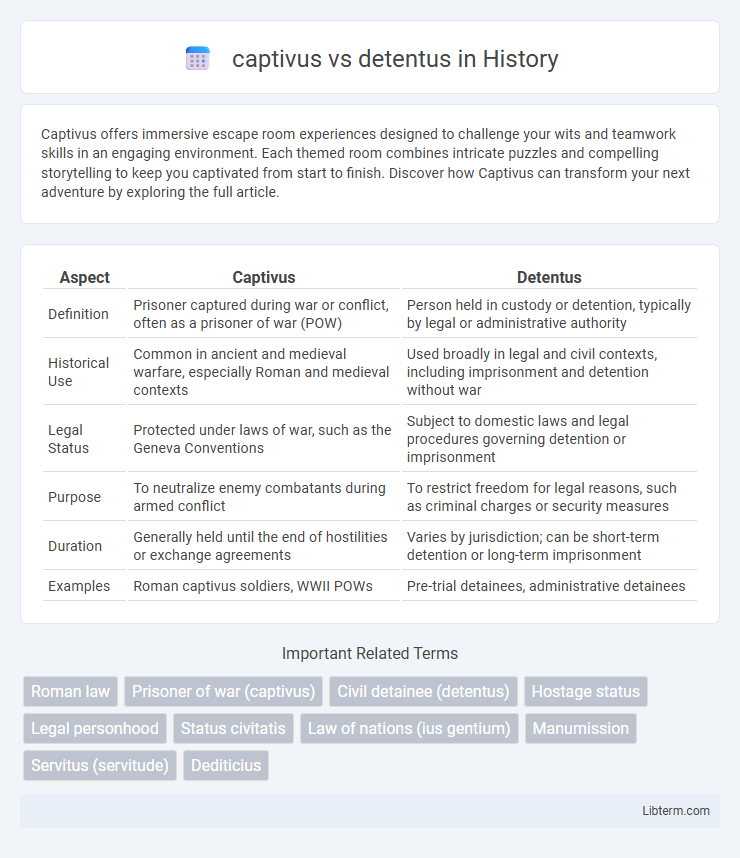Captivus offers immersive escape room experiences designed to challenge your wits and teamwork skills in an engaging environment. Each themed room combines intricate puzzles and compelling storytelling to keep you captivated from start to finish. Discover how Captivus can transform your next adventure by exploring the full article.
Table of Comparison
| Aspect | Captivus | Detentus |
|---|---|---|
| Definition | Prisoner captured during war or conflict, often as a prisoner of war (POW) | Person held in custody or detention, typically by legal or administrative authority |
| Historical Use | Common in ancient and medieval warfare, especially Roman and medieval contexts | Used broadly in legal and civil contexts, including imprisonment and detention without war |
| Legal Status | Protected under laws of war, such as the Geneva Conventions | Subject to domestic laws and legal procedures governing detention or imprisonment |
| Purpose | To neutralize enemy combatants during armed conflict | To restrict freedom for legal reasons, such as criminal charges or security measures |
| Duration | Generally held until the end of hostilities or exchange agreements | Varies by jurisdiction; can be short-term detention or long-term imprisonment |
| Examples | Roman captivus soldiers, WWII POWs | Pre-trial detainees, administrative detainees |
Introduction to Captivus and Detentus
Captivus refers to a state where an individual is held against their will through force or threat, emphasizing physical restraint or confinement. Detentus, on the other hand, involves lawful or authorized detention, often in a legal or institutional setting, with a focus on control rather than physical force. Understanding the distinction between captivus and detentus is essential in legal contexts to differentiate unlawful captivity from authorized detention.
Etymology and Historical Background
The term "captivus" originates from the Latin verb "capere," meaning "to seize" or "to take," reflecting a person seized during war or conflict, often a prisoner of war. "Detentus," derived from "detinere," meaning "to hold back" or "to detain," historically referred to individuals lawfully confined without the status of a prisoner of war. In Roman legal tradition, captivus denoted war captives subjected to loss of liberty, while detentus described those restrained by civil or criminal authority under lawful detention.
Legal Definitions: Captivus vs Detentus
Captivus refers to an individual unlawfully seized and held captive, often implying physical restraint or imprisonment without legal authority. Detentus describes a person restrained or confined under lawful authority, such as by a legal order or detention procedure. The key legal distinction lies in the legitimacy of custody: captivus involves illegal or unauthorized imprisonment, whereas detentus encompasses detention sanctioned by legal processes.
Key Differences Between Captivus and Detentus
Captivus refers to an individual held as a prisoner, often implying captivity due to war or conflict, whereas detentus denotes a person detained by legal or administrative authorities without formal charges. The primary difference lies in the context and legality, with captivus emphasizing unlawful or wartime captivity and detentus involving lawful detention under state or institutional authority. Understanding these distinctions is crucial in international law and human rights to properly classify and address the status and treatment of individuals deprived of liberty.
Use in Classical and Modern Contexts
Captivus and detentus both relate to forms of detention but differ in classical and modern contexts; captivus primarily referred to prisoners of war or slaves in ancient Roman law, emphasizing physical captivity and complete loss of freedom. Detentus evolved to describe broader legal detention, including imprisonment under lawful authority without full deprivation of personal rights, a distinction evident in modern legal systems where detentus often applies to administrative or preventive detention. Understanding these nuances highlights the shift from purely physical captivity in classical times to more complex legal interpretations of detention in contemporary jurisprudence.
Sociopolitical Implications
Captivus and detentus represent distinct forms of confinement with significant sociopolitical implications in legal and human rights discourse. Captivus typically refers to captivity imposed during wartime or conflict, raising issues of international humanitarian law and the treatment of prisoners of war, while detentus involves civil detention often linked to political repression or state control mechanisms. Understanding these terms is crucial for assessing state power, individual freedoms, and compliance with global human rights standards in both conflict and peacetime contexts.
Captivus and Detentus in Literature
Captivus and detentus in literature represent distinct forms of captivity where captivus signifies a prisoner of war or someone seized by enemies, often depicted with emphasis on the conditions of capture and subjugation. Detentus, by contrast, refers to an individual held in custody or confinement without the formal status of a prisoner, highlighting legal or administrative restraint. Literary texts use captivus to explore themes of violence, domination, and survival, while detentus reflects narratives centered on justice, imprisonment, and civil authority.
Contemporary Relevance in Law and Society
Captivus and detentus remain pivotal in contemporary law, distinguishing unlawful captivity from lawful detention based on consent and legal authority. Modern legal systems emphasize due process and human rights, using these concepts to address wrongful imprisonment and protect personal liberty. The nuanced application of captivus and detentus informs debates on police powers, immigration control, and prison reforms worldwide.
Common Misconceptions and Clarifications
Captivus and detentus are often mistakenly used interchangeably, but captivus specifically refers to a person lawfully confined as a prisoner of war, whereas detentus denotes anyone held in custody under legal authority, including administrative detention. A common misconception is that detentus always implies unlawful detention; however, many legal systems recognize detentus as lawful confinement pending trial or investigation. Clarifying these distinctions helps prevent conflating lawful arrest or internment with wrongful imprisonment, ensuring accurate legal interpretation and application.
Conclusion: Understanding Captivus and Detentus
Captivus and detentus both refer to forms of unlawful restraint but differ fundamentally in their legal implications and context. Captivus specifically denotes imprisonment resulting from war or conflict, emphasizing wartime captivity protected under international law. Detentus involves detention without due process, often in civilian or peacetime scenarios, highlighting violations of individual rights and legal protections.
captivus Infographic

 libterm.com
libterm.com